Journal Entry: Problems in Political Communication and US Elections
VerifiedAdded on 2022/10/19
|5
|1081
|13
Journal and Reflective Writing
AI Summary
This journal entry, written by a student, reflects on the problems encountered in political communication, specifically focusing on the US elections. The author discusses the role of various societal forces, including advocacy groups and the media, in shaping public opinion. The assignment highlights instances where media coverage, particularly television and social media, influenced voter preferences and attitudes towards candidates. The student analyzes the impact of news articles on voter opinions and the importance of effective political communication during campaigns. Furthermore, the entry explores the media dependency theory, examining the interplay between the media system, social system (government), and audiences, emphasizing the media's significant influence on politics and society. The author references several academic sources to support their analysis.
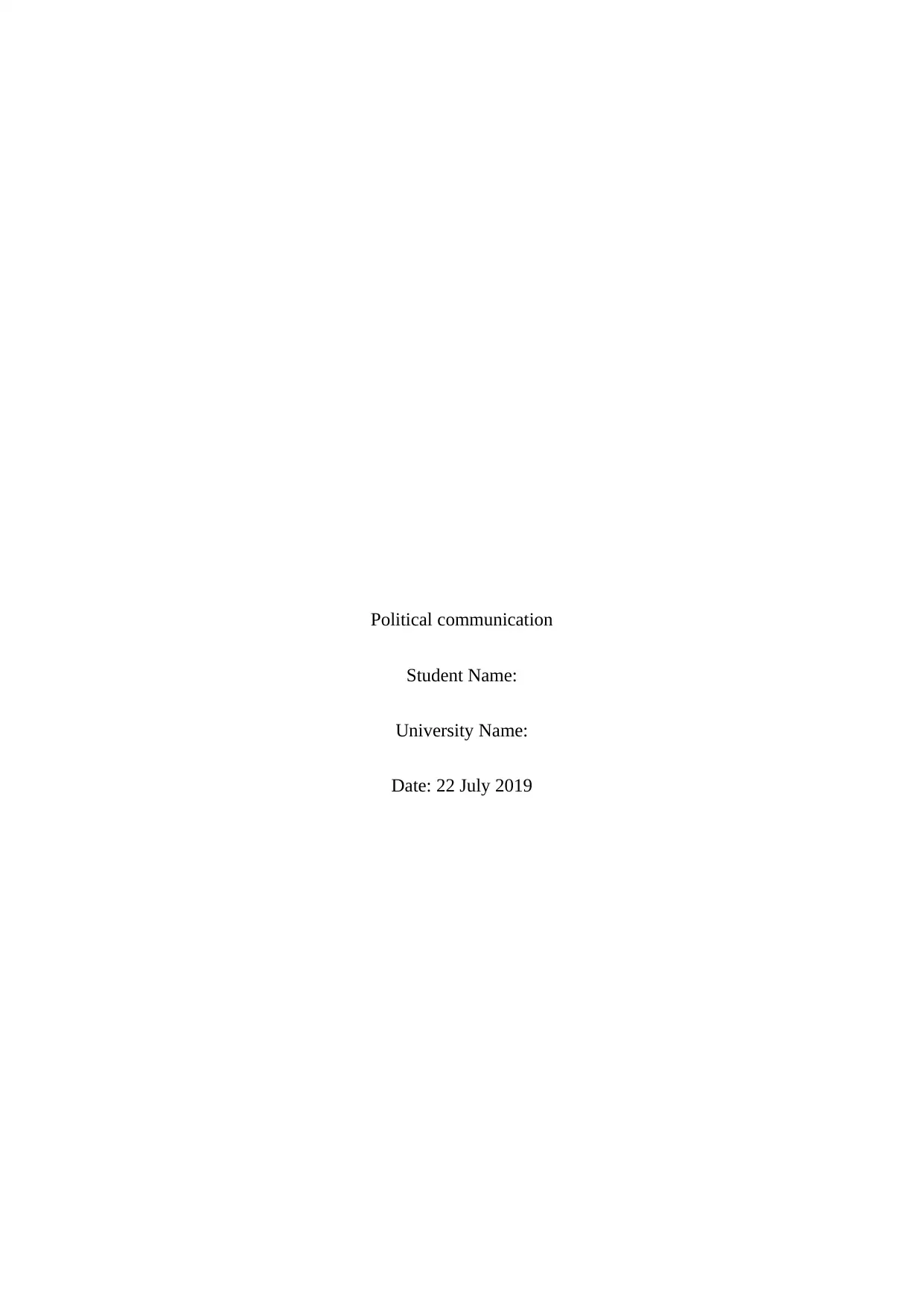
Political communication
Student Name:
University Name:
Date: 22 July 2019
Student Name:
University Name:
Date: 22 July 2019
Paraphrase This Document
Need a fresh take? Get an instant paraphrase of this document with our AI Paraphraser
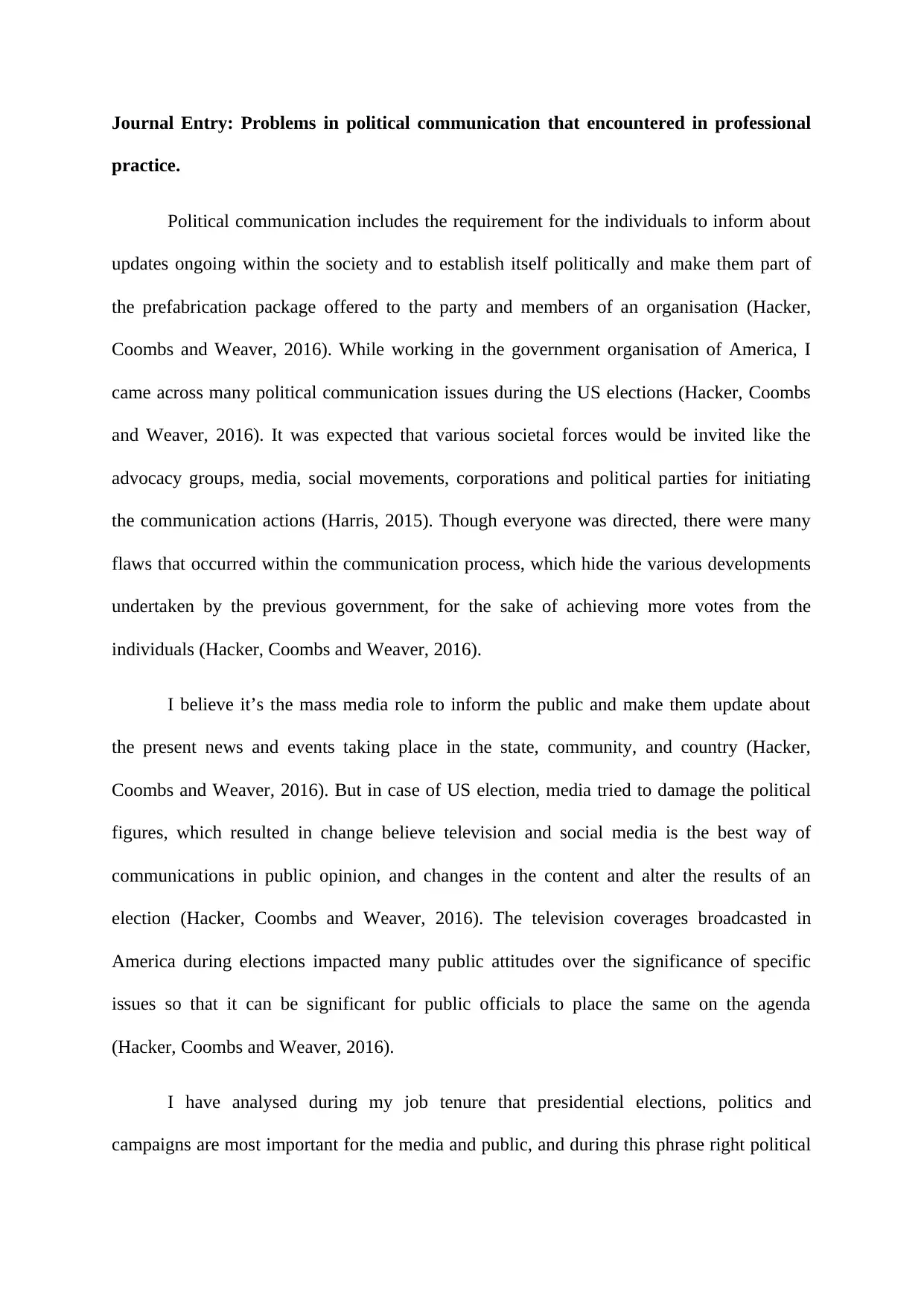
Journal Entry: Problems in political communication that encountered in professional
practice.
Political communication includes the requirement for the individuals to inform about
updates ongoing within the society and to establish itself politically and make them part of
the prefabrication package offered to the party and members of an organisation (Hacker,
Coombs and Weaver, 2016). While working in the government organisation of America, I
came across many political communication issues during the US elections (Hacker, Coombs
and Weaver, 2016). It was expected that various societal forces would be invited like the
advocacy groups, media, social movements, corporations and political parties for initiating
the communication actions (Harris, 2015). Though everyone was directed, there were many
flaws that occurred within the communication process, which hide the various developments
undertaken by the previous government, for the sake of achieving more votes from the
individuals (Hacker, Coombs and Weaver, 2016).
I believe it’s the mass media role to inform the public and make them update about
the present news and events taking place in the state, community, and country (Hacker,
Coombs and Weaver, 2016). But in case of US election, media tried to damage the political
figures, which resulted in change believe television and social media is the best way of
communications in public opinion, and changes in the content and alter the results of an
election (Hacker, Coombs and Weaver, 2016). The television coverages broadcasted in
America during elections impacted many public attitudes over the significance of specific
issues so that it can be significant for public officials to place the same on the agenda
(Hacker, Coombs and Weaver, 2016).
I have analysed during my job tenure that presidential elections, politics and
campaigns are most important for the media and public, and during this phrase right political
practice.
Political communication includes the requirement for the individuals to inform about
updates ongoing within the society and to establish itself politically and make them part of
the prefabrication package offered to the party and members of an organisation (Hacker,
Coombs and Weaver, 2016). While working in the government organisation of America, I
came across many political communication issues during the US elections (Hacker, Coombs
and Weaver, 2016). It was expected that various societal forces would be invited like the
advocacy groups, media, social movements, corporations and political parties for initiating
the communication actions (Harris, 2015). Though everyone was directed, there were many
flaws that occurred within the communication process, which hide the various developments
undertaken by the previous government, for the sake of achieving more votes from the
individuals (Hacker, Coombs and Weaver, 2016).
I believe it’s the mass media role to inform the public and make them update about
the present news and events taking place in the state, community, and country (Hacker,
Coombs and Weaver, 2016). But in case of US election, media tried to damage the political
figures, which resulted in change believe television and social media is the best way of
communications in public opinion, and changes in the content and alter the results of an
election (Hacker, Coombs and Weaver, 2016). The television coverages broadcasted in
America during elections impacted many public attitudes over the significance of specific
issues so that it can be significant for public officials to place the same on the agenda
(Hacker, Coombs and Weaver, 2016).
I have analysed during my job tenure that presidential elections, politics and
campaigns are most important for the media and public, and during this phrase right political
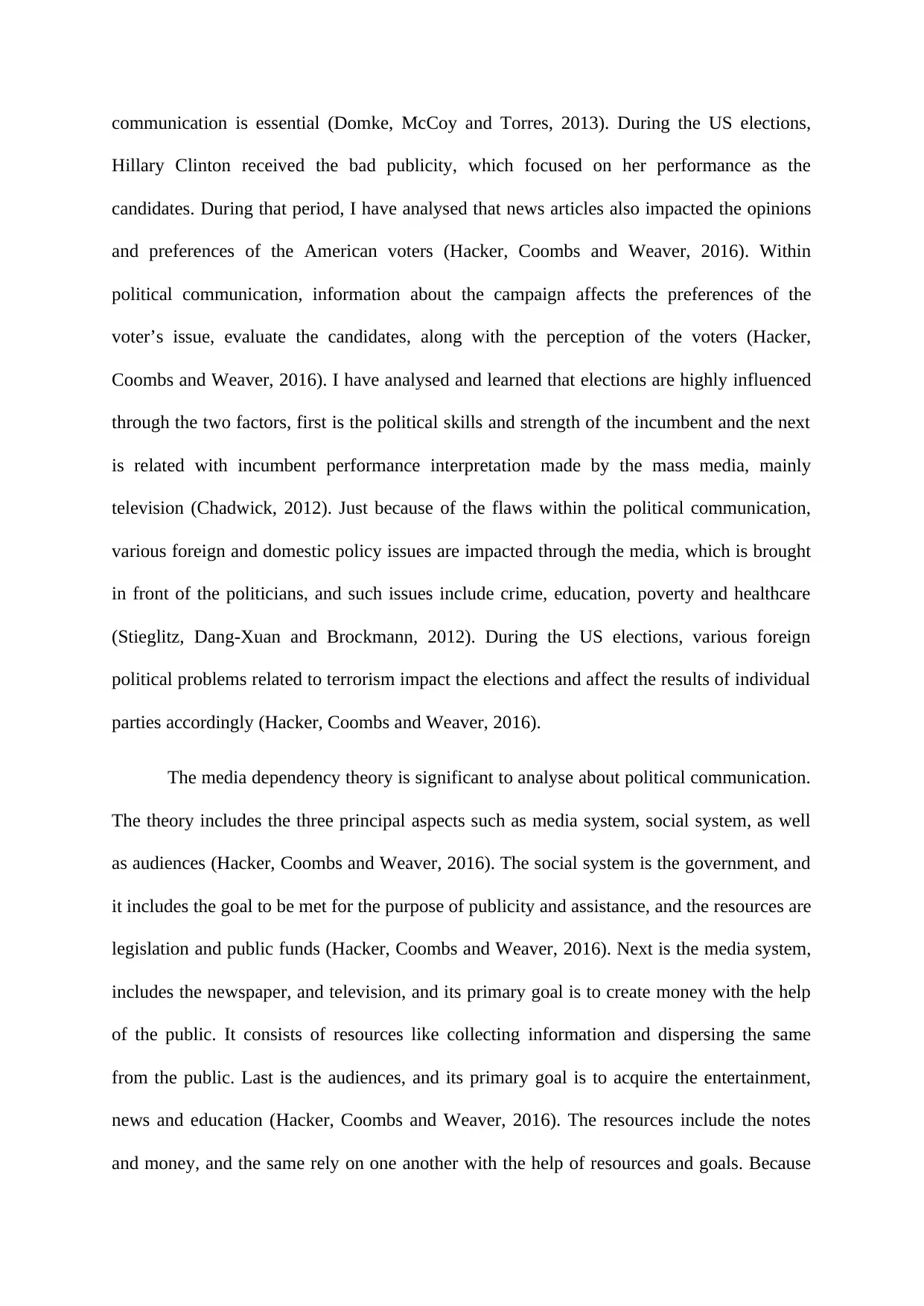
communication is essential (Domke, McCoy and Torres, 2013). During the US elections,
Hillary Clinton received the bad publicity, which focused on her performance as the
candidates. During that period, I have analysed that news articles also impacted the opinions
and preferences of the American voters (Hacker, Coombs and Weaver, 2016). Within
political communication, information about the campaign affects the preferences of the
voter’s issue, evaluate the candidates, along with the perception of the voters (Hacker,
Coombs and Weaver, 2016). I have analysed and learned that elections are highly influenced
through the two factors, first is the political skills and strength of the incumbent and the next
is related with incumbent performance interpretation made by the mass media, mainly
television (Chadwick, 2012). Just because of the flaws within the political communication,
various foreign and domestic policy issues are impacted through the media, which is brought
in front of the politicians, and such issues include crime, education, poverty and healthcare
(Stieglitz, Dang-Xuan and Brockmann, 2012). During the US elections, various foreign
political problems related to terrorism impact the elections and affect the results of individual
parties accordingly (Hacker, Coombs and Weaver, 2016).
The media dependency theory is significant to analyse about political communication.
The theory includes the three principal aspects such as media system, social system, as well
as audiences (Hacker, Coombs and Weaver, 2016). The social system is the government, and
it includes the goal to be met for the purpose of publicity and assistance, and the resources are
legislation and public funds (Hacker, Coombs and Weaver, 2016). Next is the media system,
includes the newspaper, and television, and its primary goal is to create money with the help
of the public. It consists of resources like collecting information and dispersing the same
from the public. Last is the audiences, and its primary goal is to acquire the entertainment,
news and education (Hacker, Coombs and Weaver, 2016). The resources include the notes
and money, and the same rely on one another with the help of resources and goals. Because
Hillary Clinton received the bad publicity, which focused on her performance as the
candidates. During that period, I have analysed that news articles also impacted the opinions
and preferences of the American voters (Hacker, Coombs and Weaver, 2016). Within
political communication, information about the campaign affects the preferences of the
voter’s issue, evaluate the candidates, along with the perception of the voters (Hacker,
Coombs and Weaver, 2016). I have analysed and learned that elections are highly influenced
through the two factors, first is the political skills and strength of the incumbent and the next
is related with incumbent performance interpretation made by the mass media, mainly
television (Chadwick, 2012). Just because of the flaws within the political communication,
various foreign and domestic policy issues are impacted through the media, which is brought
in front of the politicians, and such issues include crime, education, poverty and healthcare
(Stieglitz, Dang-Xuan and Brockmann, 2012). During the US elections, various foreign
political problems related to terrorism impact the elections and affect the results of individual
parties accordingly (Hacker, Coombs and Weaver, 2016).
The media dependency theory is significant to analyse about political communication.
The theory includes the three principal aspects such as media system, social system, as well
as audiences (Hacker, Coombs and Weaver, 2016). The social system is the government, and
it includes the goal to be met for the purpose of publicity and assistance, and the resources are
legislation and public funds (Hacker, Coombs and Weaver, 2016). Next is the media system,
includes the newspaper, and television, and its primary goal is to create money with the help
of the public. It consists of resources like collecting information and dispersing the same
from the public. Last is the audiences, and its primary goal is to acquire the entertainment,
news and education (Hacker, Coombs and Weaver, 2016). The resources include the notes
and money, and the same rely on one another with the help of resources and goals. Because
⊘ This is a preview!⊘
Do you want full access?
Subscribe today to unlock all pages.

Trusted by 1+ million students worldwide
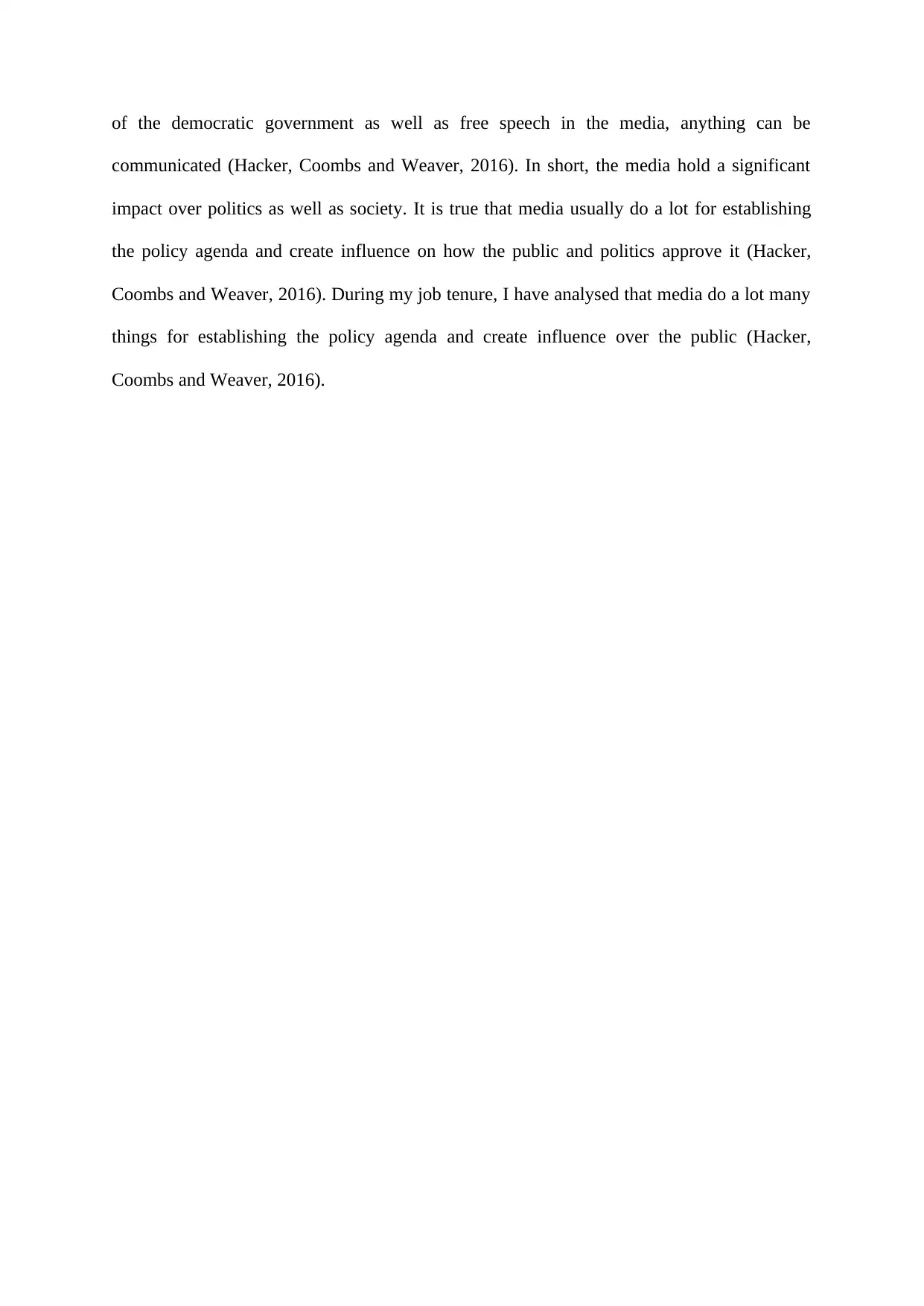
of the democratic government as well as free speech in the media, anything can be
communicated (Hacker, Coombs and Weaver, 2016). In short, the media hold a significant
impact over politics as well as society. It is true that media usually do a lot for establishing
the policy agenda and create influence on how the public and politics approve it (Hacker,
Coombs and Weaver, 2016). During my job tenure, I have analysed that media do a lot many
things for establishing the policy agenda and create influence over the public (Hacker,
Coombs and Weaver, 2016).
communicated (Hacker, Coombs and Weaver, 2016). In short, the media hold a significant
impact over politics as well as society. It is true that media usually do a lot for establishing
the policy agenda and create influence on how the public and politics approve it (Hacker,
Coombs and Weaver, 2016). During my job tenure, I have analysed that media do a lot many
things for establishing the policy agenda and create influence over the public (Hacker,
Coombs and Weaver, 2016).
Paraphrase This Document
Need a fresh take? Get an instant paraphrase of this document with our AI Paraphraser
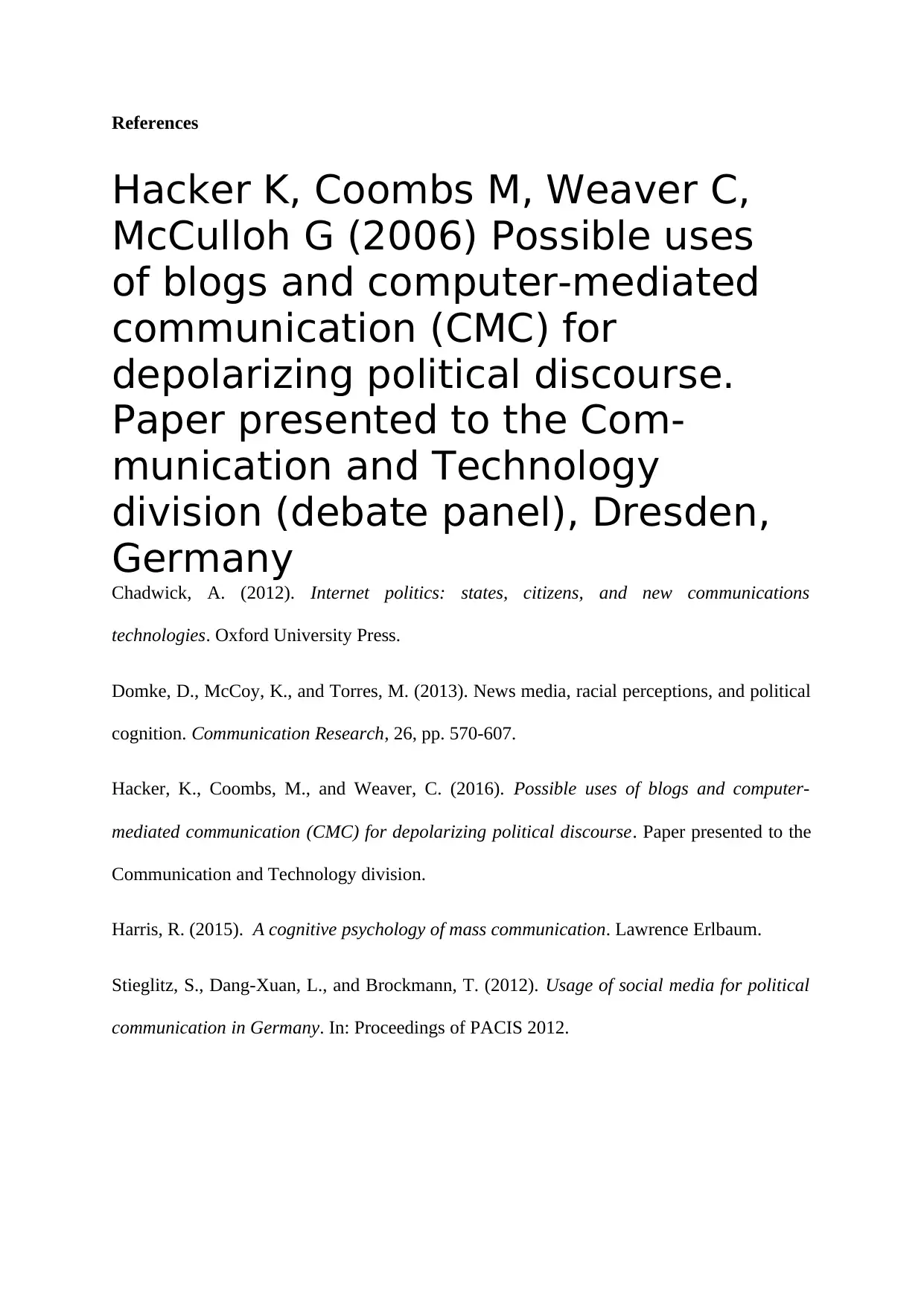
References
Hacker K, Coombs M, Weaver C,
McCulloh G (2006) Possible uses
of blogs and computer-mediated
communication (CMC) for
depolarizing political discourse.
Paper presented to the Com-
munication and Technology
division (debate panel), Dresden,
Germany
Chadwick, A. (2012). Internet politics: states, citizens, and new communications
technologies. Oxford University Press.
Domke, D., McCoy, K., and Torres, M. (2013). News media, racial perceptions, and political
cognition. Communication Research, 26, pp. 570-607.
Hacker, K., Coombs, M., and Weaver, C. (2016). Possible uses of blogs and computer-
mediated communication (CMC) for depolarizing political discourse. Paper presented to the
Communication and Technology division.
Harris, R. (2015). A cognitive psychology of mass communication. Lawrence Erlbaum.
Stieglitz, S., Dang-Xuan, L., and Brockmann, T. (2012). Usage of social media for political
communication in Germany. In: Proceedings of PACIS 2012.
Hacker K, Coombs M, Weaver C,
McCulloh G (2006) Possible uses
of blogs and computer-mediated
communication (CMC) for
depolarizing political discourse.
Paper presented to the Com-
munication and Technology
division (debate panel), Dresden,
Germany
Chadwick, A. (2012). Internet politics: states, citizens, and new communications
technologies. Oxford University Press.
Domke, D., McCoy, K., and Torres, M. (2013). News media, racial perceptions, and political
cognition. Communication Research, 26, pp. 570-607.
Hacker, K., Coombs, M., and Weaver, C. (2016). Possible uses of blogs and computer-
mediated communication (CMC) for depolarizing political discourse. Paper presented to the
Communication and Technology division.
Harris, R. (2015). A cognitive psychology of mass communication. Lawrence Erlbaum.
Stieglitz, S., Dang-Xuan, L., and Brockmann, T. (2012). Usage of social media for political
communication in Germany. In: Proceedings of PACIS 2012.
1 out of 5
Related Documents
Your All-in-One AI-Powered Toolkit for Academic Success.
+13062052269
info@desklib.com
Available 24*7 on WhatsApp / Email
![[object Object]](/_next/static/media/star-bottom.7253800d.svg)
Unlock your academic potential
Copyright © 2020–2026 A2Z Services. All Rights Reserved. Developed and managed by ZUCOL.





